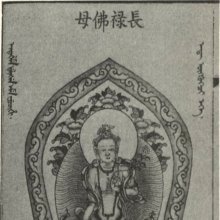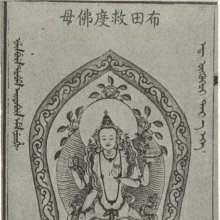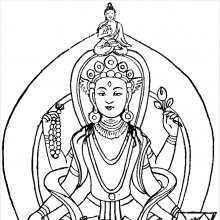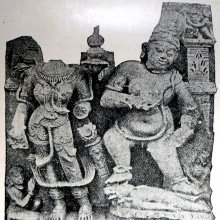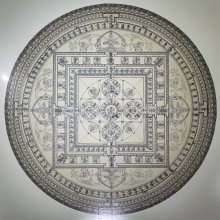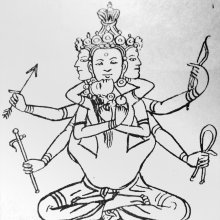Dhanada, Dhana-da, Dhanadā: 21 definitions
Introduction:
Dhanada means something in Buddhism, Pali, Hinduism, Sanskrit, Jainism, Prakrit, the history of ancient India. If you want to know the exact meaning, history, etymology or English translation of this term then check out the descriptions on this page. Add your comment or reference to a book if you want to contribute to this summary article.
Images (photo gallery)
(+3 more images available)
In Hinduism
Purana and Itihasa (epic history)
Source: archive.org: Shiva Purana - English TranslationDhanada (धनद) is a name that Guṇanidhi obtained from Umā, as a result of his severe penance, as mentioned in the Śivapurāṇa 2.1.19. Accordingly, as Umā said to Guṇanidhi:—“[...] dear son, I am delighted at your penance. I shall give you the boon you desire. You will be the lord of treasures and the lord of Guhyakas. You will be the king of Yakṣas, Kinnaras and rulers. You will be the leader of Puṇyajanas and the bestower of wealth [viz., Dhanada] to all (sarva). My friendship with you shall remain for ever. I shall stay near you, very near Alakā, dear friend, in order to increase your love. O son of Yajñadatta, great devotee, come on. This is your mother. Fall at her feet with delighted heart”.
Source: Cologne Digital Sanskrit Dictionaries: The Purana Index1a) Dhanada (धनद).—Kubera (s.v.) son of Viśravā.*
- * Bhāgavata-purāṇa IX. 2. 32. Viṣṇu-purāṇa III. 2. 11.
1b) An Āditya.*
- * Matsya-purāṇa 171. 56.
1c) A Marut of the III Gaṇa.*
- * Brahmāṇḍa-purāṇa III. 5. 94.
Dhanadā (धनदा) refers to the name of a Lady mentioned in the Mahābhārata (cf. IX.45.13). Note: The Mahābhārata (mentioning Dhanadā) is a Sanskrit epic poem consisting of 100,000 ślokas (metrical verses) and is over 2000 years old.

The Purana (पुराण, purāṇas) refers to Sanskrit literature preserving ancient India’s vast cultural history, including historical legends, religious ceremonies, various arts and sciences. The eighteen mahapuranas total over 400,000 shlokas (metrical couplets) and date to at least several centuries BCE.
Shaktism (Shakta philosophy)
Source: Google Books: ManthanabhairavatantramDhanadā (धनदा) is the name of the Yakṣiṇī associated with Dhanadā, one the eight Sacred Seats (pīṭha), according to the Yogakhaṇḍa (chapter 14) of the Manthānabhairavatantra, a vast sprawling work that belongs to a corpus of Tantric texts concerned with the worship of the goddess Kubjikā.

Shakta (शाक्त, śākta) or Shaktism (śāktism) represents a tradition of Hinduism where the Goddess (Devi) is revered and worshipped. Shakta literature includes a range of scriptures, including various Agamas and Tantras, although its roots may be traced back to the Vedas.
In Buddhism
Theravada (major branch of Buddhism)
Source: Pali Kanon: Pali Proper NamesSee Kuvera.
Theravāda is a major branch of Buddhism having the the Pali canon (tipitaka) as their canonical literature, which includes the vinaya-pitaka (monastic rules), the sutta-pitaka (Buddhist sermons) and the abhidhamma-pitaka (philosophy and psychology).
Tibetan Buddhism (Vajrayana or tantric Buddhism)
Source: Wisdom Library: Tibetan BuddhismDhanada (धनद) is the name of a deity summoned by the Yamāntaka-mantra and mentioned as attending the teachings in the 6th century Mañjuśrīmūlakalpa: one of the largest Kriyā Tantras devoted to Mañjuśrī (the Bodhisattva of wisdom) representing an encyclopedia of knowledge primarily concerned with ritualistic elements in Buddhism. The teachings in this text originate from Mañjuśrī and were taught to and by Buddha Śākyamuni in the presence of a large audience (including Dhanada).
Source: Google Books: VajrayoginiDhanada (धनद) is another name for Kubera: protector deity of the northern cremation ground.—Synonyms for Kubera are Dhanada (Saṃvarodayatantra 17.39), Yakṣādhipa (Guhyasamayasādhanamālā 34) or Vaiśravaṇa (Gyatso). Kubera is the custodian of wealth, and king of the yakṣas. Iconographically in the Śmaśānavidhi, Kubera has a human mount (naravāhana), is yellow, and holds a “mongoose spitting out a jewel” and skull bowl. In the Adbhutaśmaśānālaṃkāra he is yellow, mounted on a nidhi and holds a club (left) and makes the gesture of threatening (right).
Source: archive.org: The Indian Buddhist Iconography1) Dhanada (धनद) or Dhanadatārā refers to a deity from the Green Tārā family, according to Buddhist Iconography.—Dhanada Tārā carries the book and the rosary in the first pair of hands, while the second pair carries objects similar to those held by Durgottāriṇī. She has an animal for her Vāhana, is accompanied by eight goddesses originating from the eight syllables of her mantra and bears the image of Amoghasiddhi on the crown. [...] Strictly speaking, only those deities can be called Tārās to whom the mantra: “oṃ tārā tuttāre ture svāhā” is assigned. [...] From the colour of the different Tārās it will be possible to refer them [viz., Dhanada] to their respective Kulas or families presided over by the five Dhyāni Buddhas.
2) Dhanada (धनद) and Sudattā refers to one of the eight Yakṣa and Śakti pair occupying the double lotus in the sādhana of Jambhala (yab-yum form), as described in the 5th-century Sādhanamālā (a collection of sādhana texts that contain detailed instructions for rituals).—Accordingly, when represented in Yab-Yum, he sits on the moon under which there is a double lotus of eight petals. [...] The eight petals of the lotus seat are occupied by the eight Yakṣas [viz., Dhanada], who are identical in all respects with the principal figure. Each Yakṣa is accompanied by a Śakti [viz., Sudattā] with whom he remains in Yab-Yum in the same way as Jambhala remains with Vasudhārā [...]. The Yakṣiṇīs are identical in form with Vasudhārā, who is yellow in complexion, carries the ears of corn and shows the Varada-mudrā in her two hands.]
3) Dhanada (धनद) refers to eight Yakṣa kings, commonly depicted in Buddhist Iconography, and mentioned in the 11th-century Niṣpannayogāvalī of Mahāpaṇḍita Abhayākara.—The Yakṣas are a semi-mythical class of beings who are supposed to preside over treasures and shower wealth on mankind when propitiated. They are all collectively described in the dharmadhātuvāgīśvara-maṇḍala in one brief sentence:—“The Yakṣa kings [viz., Dhanada] hold in their hands the bījapūra (citron) and the nakula (mongoose) in the right and left hands respectively”.—Dhanada is red in colour.
Source: OSU Press: Cakrasamvara SamadhiDhanada (धनद) is the name of a deity [i.e., oṃ dhanadāya svāhā], according to the Kalaśa Pūjā [i.e., Kalasha Worship] ritual often performed in combination with the Cakrasaṃvara Samādhi, which refers to the primary pūjā and sādhanā practice of Newah Mahāyāna-Vajrayāna Buddhists in Nepal.
Source: MDPI Books: The Ocean of HeroesDhanada (धनद) refers to the “wealth-giver (Kubera)” (associated with the guṇacakra or ‘merit circle’), according to the 10th-century Ḍākārṇava-tantra: one of the last Tibetan Tantric scriptures belonging to the Buddhist Saṃvara tradition consisting of 51 chapters.—Accordingly, [while describing the Merit Circle (guṇacakra)]: “[...] In addition, there are trees, the guardians of direction (dikpāla), serpent kings, and cloud kings in order—[...] [The guardians of direction are] (1) Indra, (2) the wealth-giver (Kubera) (dhanada), (3) the Lord of Nāgas (Varuṇa), (4) Yama the Lord, (5) Īśāna, (6) the fire (Agni), (7) Rākṣasa the king, and (8) the Lord of wind (Vāyu). [...] All is here in the charnel grounds; he should give a wreath of vajras [to them] All is also to be done in this same [charnel ground]. [All is] taught to be both external and internal. The Merit Circle, the third, is thus [taught]”.

Tibetan Buddhism includes schools such as Nyingma, Kadampa, Kagyu and Gelug. Their primary canon of literature is divided in two broad categories: The Kangyur, which consists of Buddha’s words, and the Tengyur, which includes commentaries from various sources. Esotericism and tantra techniques (vajrayāna) are collected indepently.
In Jainism
General definition (in Jainism)
Source: archive.org: TrisastisalakapurusacaritraDhanada (धनद) is the name of a merchant from Śrīpura, according to chapter 5.4 [śāntinātha-caritra] of Hemacandra’s 11th century Triṣaṣṭiśalākāpuruṣacaritra: an ancient Sanskrit epic poem narrating the history and legends of sixty-three illustrious persons in Jainism.
Accordingly, as Śānti-nātha narrated to king Kurucandra:—“In this very Jambūdvīpa in this same zone Bhārata in the country Kosala in the city Śrīpura there were four merchants’ sons of the same age, like full brothers, Sudhana, Dhanapati, Dhanada, Dhaneśvara. Once upon a time the four together set out for Ratnadvīpa to seek a fortune. Their provisions were carried by Droṇaka. [...]”.

Jainism is an Indian religion of Dharma whose doctrine revolves around harmlessness (ahimsa) towards every living being. The two major branches (Digambara and Svetambara) of Jainism stimulate self-control (or, shramana, ‘self-reliance’) and spiritual development through a path of peace for the soul to progess to the ultimate goal.
India history and geography
Source: archive.org: Nilamata Purana: a cultural and literary study (history)Dhanada (धनद) corresponds to modern Vastarvan as mentioned in the Nīlamatapurāṇa.

The history of India traces the identification of countries, villages, towns and other regions of India, as well as mythology, zoology, royal dynasties, rulers, tribes, local festivities and traditions and regional languages. Ancient India enjoyed religious freedom and encourages the path of Dharma, a concept common to Buddhism, Hinduism, and Jainism.
Languages of India and abroad
Sanskrit dictionary
Source: DDSA: The practical Sanskrit-English dictionaryDhanada (धनद).—a. liberal. (-daḥ) 1 a liberal or munificent man.
2) an epithet of Kubera; जिगमिषुर्ध नदाध्युषितां दिशम् (jigamiṣurdha nadādhyuṣitāṃ diśam) R.9.25;17.8.
3) Name of fire.
4) = धनञ्जय (dhanañjaya) (4) q. v. °अनुजः (anujaḥ) an epithet of Rāvaṇa; R.12.52.88.
Dhanada is a Sanskrit compound consisting of the terms dhana and da (द).
Source: Cologne Digital Sanskrit Dictionaries: Shabda-Sagara Sanskrit-English DictionaryDhanada (धनद).—mfn.
(-daḥ-dā-daṃ) Beneficent, liberal, who gives away property, &c. m.
(-daḥ) A name of Kuvera. E. dhana wealth, deṅ to drink, or dā to give, affix ka, or dhanaṃ dayate de pālane .
Source: Cologne Digital Sanskrit Dictionaries: Benfey Sanskrit-English DictionaryDhanada (धनद).—[dhana-da], I. adj. Liberal, Kām. Nītis. 3, 23. Ii. m. A name of Kuvera, [Rāmāyaṇa] 3, 39, 20.
Source: Cologne Digital Sanskrit Dictionaries: Cappeller Sanskrit-English DictionaryDhanada (धनद).—[adjective] giving money or wealth, munificent, liberal; [masculine] [Epithet] of Kubera, [Name] of a serpent-demon & [several] men.
--- OR ---
Dhanadā (धनदा).—[adjective] bestowing the prize, the booty, or treasures.
Source: Cologne Digital Sanskrit Dictionaries: Monier-Williams Sanskrit-English Dictionary1) Dhanada (धनद):—[=dhana-da] [from dhana > dhan] mf(ā)n. ‘w°-giving’, liberal, [Kāmandakīya-nītisāra]
2) [v.s. ...] m. Barringtonia Acutangula, [cf. Lexicographers, esp. such as amarasiṃha, halāyudha, hemacandra, etc.]
3) [v.s. ...] Name of Kubera, [Mahābhārata; Rāmāyaṇa] etc.
4) [v.s. ...] a Guhyaka, [cf. Lexicographers, esp. such as amarasiṃha, halāyudha, hemacandra, etc.]
5) [v.s. ...] Name of a servant of Padma-pāṇi, [Horace H. Wilson]
6) [v.s. ...] of sub voce men, [Siṃhāsana-dvātriṃśikā or vikramāditya-caritra, jaina recension]
7) [v.s. ...] of a monkey, [Rāmatāpanīya-upaniṣad]
8) [v.s. ...] of a mountain, [Mahābhārata]
9) Dhanadā (धनदा):—[=dhana-dā] [from dhana-da > dhana > dhan] a f. Name of one of the Mātṛs attending on Skanda, [Mahābhārata]
10) [v.s. ...] of a Tantra deity, [Tantrasāra]
11) Dhanada (धनद):—[=dhana-da] [from dhana > dhan] n. a kind of house, [Demetrius Galanos’s Lexiko: sanskritikes, anglikes, hellenikes]
12) Dhanadā (धनदा):—[=dhana-dā] [from dhana > dhan] b mfn. prize. giving, giving booty or treasures, [Ṛg-veda; Atharva-veda] (cf. -da).
13) Dhānada (धानद):—mf(ī)n. relating to Dhanada id est. Kubera, [ṢaḍvBr. v, 1.]
Source: Cologne Digital Sanskrit Dictionaries: Yates Sanskrit-English DictionaryDhanada (धनद):—[dhana-da] (daḥ) 1. m. Kuvera. a. Liberal.
[Sanskrit to German]
Sanskrit, also spelled संस्कृतम् (saṃskṛtam), is an ancient language of India commonly seen as the grandmother of the Indo-European language family (even English!). Closely allied with Prakrit and Pali, Sanskrit is more exhaustive in both grammar and terms and has the most extensive collection of literature in the world, greatly surpassing its sister-languages Greek and Latin.
Kannada-English dictionary
Source: Alar: Kannada-English corpusDhanada (ಧನದ):—[adjective] bestowing wealth.
--- OR ---
Dhanada (ಧನದ):—
1) [noun] Kubēra, the regent of wealth.
2) [noun] a wealthy man.
3) [noun] a man who liberally donates money.
Kannada is a Dravidian language (as opposed to the Indo-European language family) mainly spoken in the southwestern region of India.
See also (Relevant definitions)
Partial matches: Da, Dhana, Ta, Tana.
Starts with (+1): Dhanada kavi, Dhanadadeva, Dhanadakshi, Dhanadamantra, Dhanadamgura, Dhanadana, Dhanadananibandhana, Dhanadanda, Dhanadanuja, Dhanadapancanga, Dhanadaprayoga, Dhanadapujayantra, Dhanadarpa, Dhanadastotra, Dhanadatara, Dhanadatirtha, Dhanadatta, Dhanadaulata, Dhanadavasa, Dhanadaya.
Ends with: Adhanada, Pravriddhanada.
Full-text (+30): Dhanadanuja, Dhanadastotra, Dhanadamantra, Dhanadapujayantra, Dhanadakshi, Dhanadeshvara, Dhanadatirtha, Dhanadadeva, Dhanadayin, Dhanadanda, Dhanadaya, Dhanadeshvaratirtha, Kubera, Tanatan, Dhanada kavi, Jivamatrika, Kamapala, Vrita, Varunapancami, Vasantadeva.
Relevant text
Search found 32 books and stories containing Dhanada, Dhana-da, Dhanadā, Dhana-dā, Dhānada; (plurals include: Dhanadas, das, Dhanadās, dās, Dhānadas). You can also click to the full overview containing English textual excerpts. Below are direct links for the most relevant articles:
Rig Veda (translation and commentary) (by H. H. Wilson)
Garga Samhita (English) (by Danavir Goswami)
Verse 6.10.38 < [Chapter 10 - In the Description of the Gomatī River, the Glories of Cakra-tīrtha]
Verse 2.5.12 < [Chapter 5 - The Liberation of Bakāsura]
Verse 1.12.43 < [Chapter 12 - Description of Śrī Nanda’s Festival]
The Gautami Mahatmya (by G. P. Bhatt)
Trishashti Shalaka Purusha Caritra (by Helen M. Johnson)
Part 5: Vasudeva’s embassy for Kubera < [Chapter III - Vasudeva’s Marriage with Kanakavatī and her Former Incarnations]
Part 3: Birth and childhood of Kanakavatī < [Chapter III - Vasudeva’s Marriage with Kanakavatī and her Former Incarnations]
Part 3: Rejoicing at the Arhat’s conception < [Chapter II - Birth of Ajita and Sagara]
The Skanda Purana (by G. V. Tagare)
Chapter 68 - The Greatness of Dhanada < [Section 3 - Revā-khaṇḍa]
Chapter 56 - Greatness of Dhanadeśvara (Dhanada-īśvara) < [Section 1 - Prabhāsa-kṣetra-māhātmya]
Chapter 107 - The Greatness of Bhaṇḍārī Tīrtha < [Section 3 - Revā-khaṇḍa]
The Agni Purana (by N. Gangadharan)
Related products
